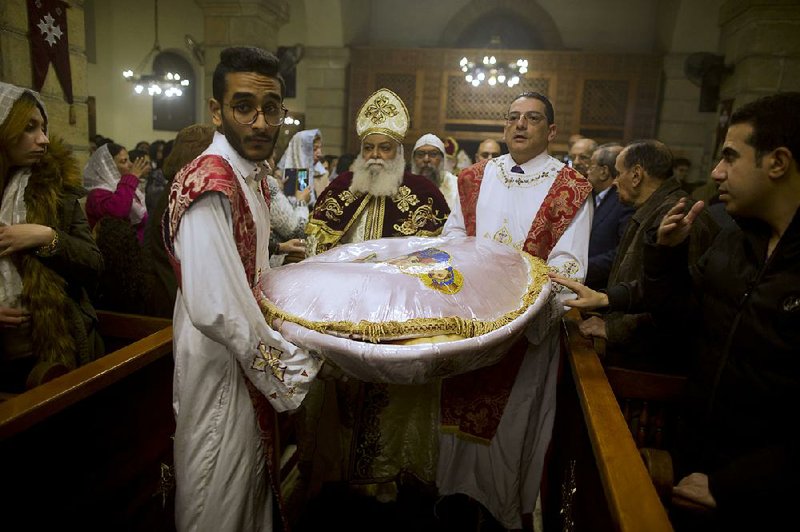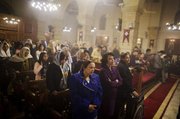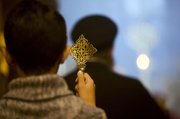CAIRO -- In a show of solidarity with Egypt's embattled Christians, President Abdel-Fattah el-Sissi on Saturday made a symbolic appearance at an Orthodox Christmas Mass in a new cathedral.
"We, with the grace of God, are offering a message of peace and love from here, not just to Egyptians or to the region, but to the entire world," el-Sissi told a jubilant congregation while standing next to Pope Tawadros II, the Coptic pontiff.
"I always say this and repeat it: Destruction, ruin and killing will never be able to defeat goodness, construction, love and peace. It's impossible," said el-Sissi, a Muslim. "Pay attention, you are our family. You are part of us. We are one and no one will ever drive a wedge between us."
In Cairo and across much of the Muslim-majority country, tens of thousands of soldiers in full combat gear joined the police in protecting churches, most of which are now equipped with metal detectors. Worshippers undergo body searches at church entrances. Some churches have had their surrounding streets sealed off, with sidewalks barricaded to control pedestrian movement.
The tight security across Egypt is a precaution against possible attacks by Islamic militants who have specifically targeted Christians since December 2016, staging a series of bombings, killing about 100 people.
Orthodox Christians are the overwhelming majority of Egypt's Christians, who account for about 10 percent of the population, or nearly 10 million. They celebrate Christmas today.
The new cathedral in which Mass was held has been named Christ's Nativity and is in Egypt's new administrative capital, a $45 billion, under-construction project some 28 miles east of Cairo. The Christmas Mass consecrates the new cathedral and marks the first time in living memory that the liturgy is not held at St. Mark's Cathedral, the seat of the Orthodox church in central Cairo.
The new cathedral can hold up to 9,000 worshippers and is touted as the largest in the Middle East.
El-Sissi arrived shortly after nightfall, as silver lights twinkled on the cathedral's dome, piercing the surrounding darkness. A general-turned-president, el-Sissi is viewed by most of Egypt's Christians as their protector and ally in the face of Islamists. He led the military's 2013 ouster of an Islamist president whose divisive rule alarmed many Christians fearful over their future in the country.
The cathedral's bells tolled as Tawadros received el-Sissi outside the cathedral and they walked inside together. Women ululated in jubilation, and many in the congregation waved Egyptian flags or threw white rose buds at the smiling president, who waved back and shook hands with some of them.
The consecration of the new cathedral attracted the attention of Pope Francis, the head of the Roman Catholic Church who visited Egypt last year where he spoke of the need for tolerance between Muslims and Christians.
"I'd like to express in a special way my closeness to Orthodox Coptic Christians, and I cordially greet my brother Tawadros II in the glorious occasion of the consecration of the Cathedral of Cairo," Francis said in remarks to the faithful Saturday after celebrating an Epiphany Mass in St. Peter's Basilica.
But not everyone was as positive about the new cathedral or holding Christmas Mass there.
Ishak Ibrahim, a prominent expert on Christian affairs in Egypt, said in a Facebook post that moving Mass to an "isolated" spot projected a "disappointing" message.
"Christianity never commanded us to build churches so we can boast about their size, beauty or to accord legitimacy to the sultan. Those in the villages, meanwhile, are hurt and see their churches ... shuttered," wrote Ibrahim, alluding to frequent instances of Muslim mobs in rural Egypt reacting violently to the construction or repair of churches, or the use of private Christian homes as places of worship.
An Egyptian affiliate of the Islamic State extremist group has claimed responsibility for most attacks on Christians, including a series of killings that forced scores of Christian families last year to flee their homes in northern Sinai -- the epicenter of an insurgency spearheaded by Islamic State militants, who also target the country's mainland.
Information for this article was contributed by Frances D'Emilio of The Associated Press.
A Section on 01/07/2018


